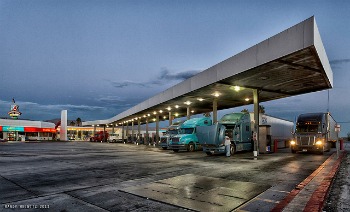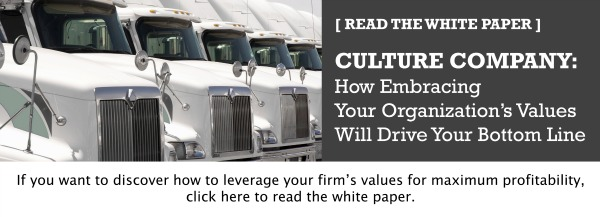 CHRIS TANKE, HNI Transportation Practice Leader & Associate Vice President
CHRIS TANKE, HNI Transportation Practice Leader & Associate Vice President
& BRIAN KAMINSKI, HNI Account Executive
The high-profile truck crash that severely injured actor Tracy Morgan has once again put a spotlight on trucking. The facts in the incident still are under investigation, and it's irrelevant to point fingers at this stage.
But an incident like this brings the importance of safety to the forefront for all transportation companies. One major accident can have a huge impact on a company's reputation. Even a company that has invested in its drivers and in safety isn't immune from this risk.
This crash got us thinking deeply about the role of safety at an organizational level and the differences between winners and losers among transportation firms.
There are many factors that drive profits and losses, particularly in an industry such as trucking where margins aren’t generous, drivers are hard to come by, and good drivers are golden. But does the difference in the operational tools and characteristics from one company to the next really explain why some firms enjoy more success than their peers?
We have 40 years of combined experience, with companies of all sizes in all industries. Over all those decades, we have noticed some culture company advantages. In our observation, firms with a culture of safety have the fewest accidents and injuries typically are better than the competition. This difference is most dramatic among industries with the thinnest margins — such as trucking.
When margins are thin, efficiency drives profit. A trucking company that has fewer workers’ compensation injuries has a larger percentage of drivers available to haul revenue-generating freight. This firm also will spend less on hiring and training (because HR doesn’t have to rehire and retrain replacement workers), insurance premiums, and paying wages for modified-duty work.
A trucking company that has fewer accidents has more equipment available to haul cargo, spends less on maintenance and repairs, spends less on rentals, etc. The efficiencies gained can move a margin from 2 percent to 3 percent, a huge improvement. The question is: How do some companies make this happen while others struggle?
Tracy Morgan Truck Crash Inspires Reflection on Your Drivers' Safety Decisions
Companies that manage safety make the effort and spend the money. Yes, it’s difficult (if not impossible) to manage the safety of a workforce that is scattered and mostly unsupervised.
If you manage safety on a factory floor, where you can observe and interact with your employees in real time, you can make an impact. But when you depend on your employees (drivers) to make decisions without supervision, you have to depend on the culture of safety.
Let's examine the Tracy Morgan truck crash that killed a man. According to the criminal compliant, the driver of the tractor-trailer that smashed into Morgan's vehicle had been up for more than 24 hours. Right now, we don't know all the details of the crash, the driver's history and training, etc. We're willing to bet, however, that you're wondering if your own drivers would have avoided such a terrible wreck. You're wondering if you can depend on your culture of safety to help drivers make safe decisions.
Safety never should be a priority. This may seem like a bold, counterintuitive statement, but think of it this way: Priorities can change, but values never do. Values are beliefs that are held so strongly that they are impervious to change. Your culture turns on certain values. When your talent lives the culture and puts those values to work every day, safety never is a priority. It’s the way everyone does business, period. Safety never changes because it’s a value.
Culture of Safety Drives Good Decision-Making
Some companies manage safety. Some companies manage culture. From our experience, the latter companies are more successful than their peers that zero in on safety. A firm’s culture is its values in practice. If all employees — from the C-suite to the dispatchers, from mechanics to drivers — live the values, the firm is destined for success. Culture drives decision-making, and all business owners know that profits and losses all ride on the decisions you (and your employees) make. Right culture, right decisions — right profits. These are the major (and majorly attractive) culture company advantages.
Related Posts:
Drivers Hold Keys to Strengthening Your Culture Through Ownership
The Importance of Corporate Culture: A Tale of Two Companies
Employee Risk Management: What It Is and Why It Matters
Why More Employers are Creating a Culture of Transparency
.png?width=69&height=53&name=Acrisure%20Logo%20(White%20Horizontal).png)

 CHRIS
CHRIS 
